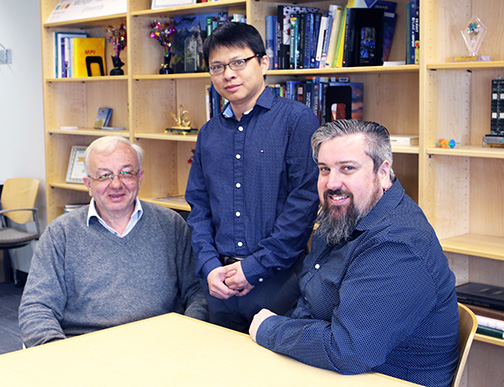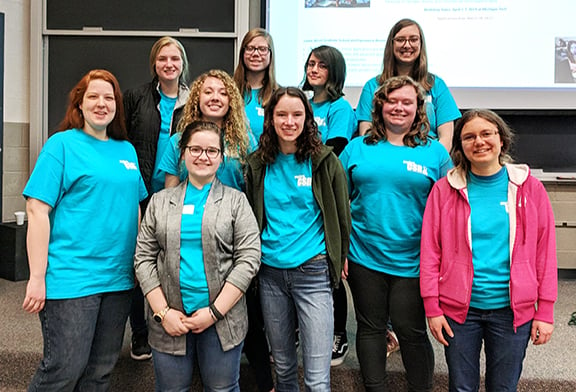 At the annual awards banquet of the Michigan Tech Institute of Computing and Cybersysytems (ICC), on Friday, April 12, three ICC members received the ICC Achievement Award in recognition of their exceptional contributions to research and learning in the fields of computing.
At the annual awards banquet of the Michigan Tech Institute of Computing and Cybersysytems (ICC), on Friday, April 12, three ICC members received the ICC Achievement Award in recognition of their exceptional contributions to research and learning in the fields of computing.
Soner Önder, director of the ICC Center for Scalable Architectures and Systems and professor of computer science, was recognized for his research in next-generation architectures. Önder is principal investigator of three National Science Foundation (NSF) grants, and he has three NSF grant proposals under review.
“Soner is one of our very top researchers in terms of research expenditures and new awards,” said Tim Havens, ICC director and the William and Gloria Jackson Associate Professor of Computer Systems. “He is also active in developing and implementing the ICC vision and activities.”
Kevin Trewartha, a member of the ICC’s Center for Human-Centered Computing, was recognized for his interdisciplinary and collaborative research at the intersection of technology and human motor movement. Trewartha is an assistant professor with a dual appointment in the departments of Cognitive and Learning Sciences and Kinesiology and Integrative Physiology.
“Kevin encompasses the best of the ICC vision,” said Beth Veinott, director of the ICC Center for Human-Centered Computing and associate professor of cognitive and learning sciences.
Trewartha is co-principal investigator, with ICC member Shane Mueller, of a new, three-year, interdisciplinary and collaborative project funded by the National Institutes of Health. For this research, Trewartha and Mueller are working with UP Health Systems Portage and five graduate and three undergraduate students to investigate how technology supports earlier diagnosis of the neurodegenerative diseases.
Bo Chen, a member of the ICC’s Center for Cyber-Physical Systems and assistant professor of computer science, was recognized for his teaching and research in cybersecurity of mobile devices.
Chen is the co-PI of two external grants on cybersecurity from the National Science Administration, and he has submitted numerous cybersecurity proposals to NSF, NSA, Microsoft, and Google.
“Dr. Bo Chen has demonstrated achievements and contributions to the mission of the ICC since coming to Michigan Tech as a tenure-track CS faculty in fall ’17,” said ICC members Guy Hembroff and Yu Cai in their nomination, adding that during that short time, “Dr. Chen has published one book, five journal papers, and 10 conference papers, and in 2017 he was awarded a Distinguished Paper Award from the prestigious cybersecurity venue, the Annual Computer Security Application Conference (ACSAC ’17).”
Chen is the faculty coach for the MTU NCL (National Cyber League) cyber competition team, and during the fall 2018 regular season under Chen’s leadership, a Michigan Tech CS undergraduate student placed 36th out of 3,350 players in NCL cyber competition. Dr. Chen was also recently recognized for receiving an exceptional “average of seven dimensions” student evaluation score for his teaching, among additional accolades.
The ICC, founded in 2015, promotes collaborative, cross-disciplinary research and learning experiences in the areas of cyber-physical systems, cybersecurity, data sciences, human-centered computing, and scalable architectures and systems. It provides faculty and students the opportunity to work across organizational boundaries to create an environment that mirrors contemporary technological innovation.
Five research centers comprise the ICC. The ICC’s 50 members, who represent 15 academic units at Michigan Tech, are collaborating to conduct impactful research, make valuable contributions in the field of computing, and solve problems of critical national importance.
Visit the ICC website at icc.mtu.edu. Contact the ICC at icc-contact@mtu.edu or 906-487-2518.
 Michigan Tech hosted the workshop “Exploring Computer Science Research” last Friday – Sunday (April 5-7). The workshop was one of 15 Google has sponsored in the U.S. and was organized by four CS Faculty: Leo Ureel, Linda Ott, Jean Mayo and Laura Brown; Jean Mayo and Laura Brown are members of the ICC. The workshop was for women and underrepresented groups to explore research and graduate school opportunities in computer science.
Michigan Tech hosted the workshop “Exploring Computer Science Research” last Friday – Sunday (April 5-7). The workshop was one of 15 Google has sponsored in the U.S. and was organized by four CS Faculty: Leo Ureel, Linda Ott, Jean Mayo and Laura Brown; Jean Mayo and Laura Brown are members of the ICC. The workshop was for women and underrepresented groups to explore research and graduate school opportunities in computer science.